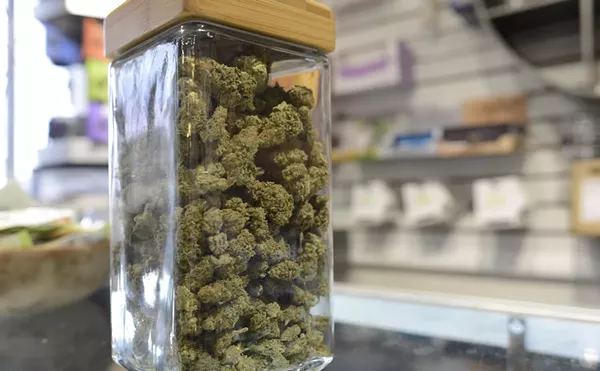Managing a healthy appetite and stable blood-sugar levels don’t typically link with cannabis use, but scientists and industry leaders are weighing in on THCV, a rare cannabinoid that behaves as a natural stimulant and offers potential help for weight and energy management.
As research into the plant evolves, discoveries of new and rare cannabis compounds have led brands to chase a variety of potential effects for consumers outside of the high created by tetrahydrocannabinol (THC), the most common cannabinoid in pot plants. Cannabidiol (CBD), cannabinol (CBN) and cannabigerol (CBG) have all been added to commercial cannabis products over the last few years, but tetrahydrocannabivarin (THCV) might be the new, hot cannabinoid on the block.
“The indication we have is that multiple companies have had this on their radar,” says Cameron Keluche, CEO of Boulder-based SUM Microdose. “It’s just been cost-prohibitive from doing it at high dosing levels.”
Research into THCV and other rare cannabinoids has been more readily available since hemp production was federally legalized in 2018. Smaller doses of THCV have been shown to be effective over time, though effects in higher doses need to be studied further, says Keluche. Cannabis breeders have created strains with THCV content as high as 15 percent for commercial extraction.
A producer of sublingual tablets dosed with low amounts of cannabinoids, SUM recently launched two products that contain THCV. According to Keluche, the tablet with 2.5 milligrams of THC and THCV promotes healthy blood-sugar levels and sustainable energy, while the tablet with 2.5 milligrams of THCV and CBD is targeted to reduce food cravings.
Edibles brands have already worked THCV into their formulas at smaller dosages, he adds, and they’re starting to notice growing interest from consumers. However, informing users about THCV and the cannabinoid’s differences from the weed they’ve become accustomed to can be a challenge.
Unlike THC, THCV is non-intoxicating in small doses, so users are buying more of a nutritional supplement than they are anything with the cannabis buzz they’re used to. However, THCV can still be paired with other cannabinoids, like THC and CBD, without internal competition in the body’s endocannabinoid receptors, presenting more options for both research and usage.
“With a precisely delivered dose, [THCV is] more cost-effective and adaptable for users,” Keluche notes.
Research around higher doses of THCV — which has been linked to slightly intoxicating effects — has taken place as well. A 2020 study published by the Journal of Cannabis Research, a publication from the Institute of Cannabis Research at Colorado State University-Pueblo, found that THCV decreased appetites while increasing satiety and regulating metabolism. According to the study, the results pointed to the cannabinoid as a remedy for weight loss and management, particularly among patients with type 2 diabetes.
The study concluded that THCV could “represent a new therapeutic agent in glycemic control in subjects with type 2 diabetes,” promoting healthy insulin levels as the endocannabinoid system regulates glucose metabolism in muscle cells.
To Keluche, functional daytime use of cannabis is all about promoting a balanced endocannabinoid system. From a wellness standpoint, regular and low-dose cannabis usage can help consumers incorporate the plant’s benefits into their daily lives and reignite a system that’s been curbed by our modern lifestyle, he posits.
“Hemp used to be a big part of people’s daily lives, but when that got cut cold turkey in the twentieth century, people stopped using it regularly like they used to,” he explains. “Traditionally, you were able to get your daily intake of nutrients from a lot of these cannabinoids.”
The endocannabinoid system also controls energy homeostasis while influencing the function of food intake within the central nervous system, something that THCV helps balance, Keluche says, so users feel healthier, stronger and more energetic throughout the day.
Other cannabis brands have been eager to incorporate THCV into their formulas. In 2018, Broomfield-based ECS Brands partnered with the Mayo Clinic and the National Institutes of Health to conduct a ninety-day human clinical study on its product, Nitro-V, which contains 2.41 milligrams of THCV, in combination with CBD, THC and other compounds. The study, published in 2021, found a 61 percent reduction in hunger and 40 percent fewer food cravings among participants, along with a 52 percent drop in anxiety.
Wana Brands, one of North America’s largest edibles companies, recently partnered with ECS to incorporate its THCV formula into Wana Fit, a new line of THC-free gummies aimed at weight loss. Denver-based Keef Brands, known for its popular line of cannabis-infused drinks, just launched its own line of beverages made with THCV and THC that are designed for appetite suppression and management.
As the pool of cannabis research expands, Keluche believes that it’s only a matter of time before public education about our endocannabinoid systems increases and in turn promotes more mainstream engagement.
“We’re trying to reintroduce this as a way to give your body the right tools and assist it in getting back to whatever you feel comfortable with,” he concludes. “Everyone’s version of healthy is different. We want to help people promote whatever that is, and that’s why many people are comfortable going the cannabinoids route — but it won’t affect everyone the same.”

Audio By Carbonatix
[
{
"name": "GPT - Billboard - Slot Inline - Content - Labeled - No Desktop",
"component": "23668565",
"insertPoint": "2",
"requiredCountToDisplay": "2"
},{
"name": "STN Player - Float - Mobile Only ",
"component": "23853568",
"insertPoint": "2",
"requiredCountToDisplay": "2"
},{
"name": "Editor Picks",
"component": "17242653",
"insertPoint": "4",
"requiredCountToDisplay": "1"
},{
"name": "Inline Links",
"component": "18838239",
"insertPoint": "8th",
"startingPoint": 8,
"requiredCountToDisplay": "7",
"maxInsertions": 25
},{
"name": "GPT - 2x Rectangles Desktop, Tower on Mobile - Labeled",
"component": "24956856",
"insertPoint": "8th",
"startingPoint": 8,
"requiredCountToDisplay": "7",
"maxInsertions": 25
},{
"name": "Inline Links",
"component": "18838239",
"insertPoint": "8th",
"startingPoint": 12,
"requiredCountToDisplay": "11",
"maxInsertions": 25
},{
"name": "GPT - Leaderboard to Tower - Slot Auto-select - Labeled",
"component": "17676724",
"insertPoint": "8th",
"startingPoint": 12,
"requiredCountToDisplay": "11",
"maxInsertions": 25
}
]












